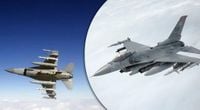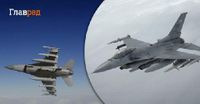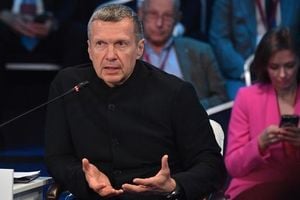In a significant move to enhance Ukraine's aerial defense capabilities, the Netherlands has announced its readiness to provide F-35 fighter jets to help secure the skies over Lviv. This development comes amid ongoing discussions among European nations about a comprehensive security plan for Ukraine, with the situation remaining fluid and details still being negotiated.
The initiative to protect the airspace over western Ukraine, particularly around Lviv, is gaining traction as European countries aim to establish a safety zone to facilitate aircraft landings. According to the Dutch Minister of Defense, Ukraine cannot manage its air defense alone and requires substantial support from its allies. "If we are talking about a safe sky, we know that with Ukraine's current capabilities, they cannot do this alone, so they need support in this," he stated in comments reported by Radio Svoboda.
While the Netherlands has the capability to deploy modern F-35 fighters, the minister emphasized that the challenge lies in organizing the entire mission and clearly defining the role of aerial defense. The coalition of European nations, informally dubbed the "coalition of expectations" by diplomatic circles, is still grappling with the specifics of the mission, leaving many uncertainties in its wake.
In addition to air support, discussions are underway regarding the coalition's potential maritime presence. Turkey has expressed its willingness to take on a pivotal role in ensuring maritime security. At a recent meeting in Brussels on April 10, 2025, Turkish officials indicated their readiness to assist with the demining of the Black Sea and to support secure passage for ships navigating grain corridors. This could position Turkey as a base state for multinational maritime forces operating in the region.
As part of the broader security strategy, Britain has made strides in developing advanced military technologies, including the successful testing of the RapidDestroyer, an electromagnetic weapon capable of neutralizing drones with powerful pulses. This system, developed by a consortium led by the French company Thales, may soon find applications in Ukraine, further bolstering the military capabilities available to the coalition.
Despite these advancements, the coalition's overall strategy remains in a state of flux, with many officials acknowledging that concrete solutions are still limited. The uncertainty surrounding the coalition's formation and mission details has led to a perception among some observers that it resembles a "coalition of waiting," rather than a decisive military alliance.
In Kyiv, recent meetings between Ukrainian military leaders and the defense chiefs from partner nations have focused on the potential deployment of foreign contingents to support Ukraine's defense efforts. British Prime Minister Keir Starmer and French President Emmanuel Macron have also engaged in discussions about the coalition's role in deploying military forces in Ukraine.
As the situation continues to evolve, the need for a coordinated and robust response to Ukraine's security challenges becomes increasingly evident. The Netherlands' offer of F-35s marks a pivotal step in international efforts to enhance Ukraine's defense capabilities, but the path forward will require careful planning and collaboration among allied nations.
With the ongoing conflict and geopolitical tensions in the region, the stakes are high for all parties involved. The ability of European nations to unite and effectively support Ukraine will not only impact the immediate security situation but will also set the tone for future international relations and military cooperation.
As discussions progress and the coalition takes shape, the world watches closely to see how these developments will unfold. The commitment of nations like the Netherlands, Turkey, and the United Kingdom to support Ukraine is a testament to the importance of collective security in the face of adversity.
In conclusion, the evolving security landscape in Ukraine underscores the critical need for a unified and strategic approach to defense. The collaboration among European nations, as they work to establish air and maritime security, reflects a growing recognition of the complexities of modern warfare and the necessity for international solidarity in addressing shared challenges.





